Abstract
OBJECTIVE--To evaluate the acceptability and efficacy of adding cognitive behaviour therapy to the medical care of patients presenting with the chronic fatigue syndrome. DESIGN--Randomised controlled trial with final assessment at 12 months. SETTING--An infectious diseases outpatient clinic. SUBJECTS--60 consecutively referred patients meeting consensus criteria for the chronic fatigue syndrome. INTERVENTIONS--Medical care comprised assessment, advice, and follow up in general practice. Patients who received cognitive behaviour therapy were offered 16 individual weekly sessions in addition to their medical care. MAIN OUTCOME MEASURES--The proportions of patients (a) who achieved normal daily functioning (Karnofsky score 80 or more) and (b) who achieved a clinically significant improvement in functioning (change in Karnofsky score 10 points or more) by 12 months after randomisation. RESULTS--Only two eligible patients refused to participate. All randomised patients completed treatment. An intention to treat analysis showed that 73% (22/30) of recipients of cognitive behaviour therapy achieved a satisfactory outcome as compared with 27% (8/30) of patients who were given only medical care (difference 47 percentage points; 95% confidence interval 24 to 69). Similar differences were observed in subsidiary outcome measures. The improvement in disability among patients given cognitive behaviour therapy continued after completion of therapy. Illness beliefs and coping behaviour previously associated with a poor outcome changed more with cognitive behaviour therapy than with medical care alone. CONCLUSION--Adding cognitive behaviour therapy to the medical care of patients with the chronic fatigue syndrome is acceptable to patients and leads to a sustained reduction in functional impairment.
Full text
PDF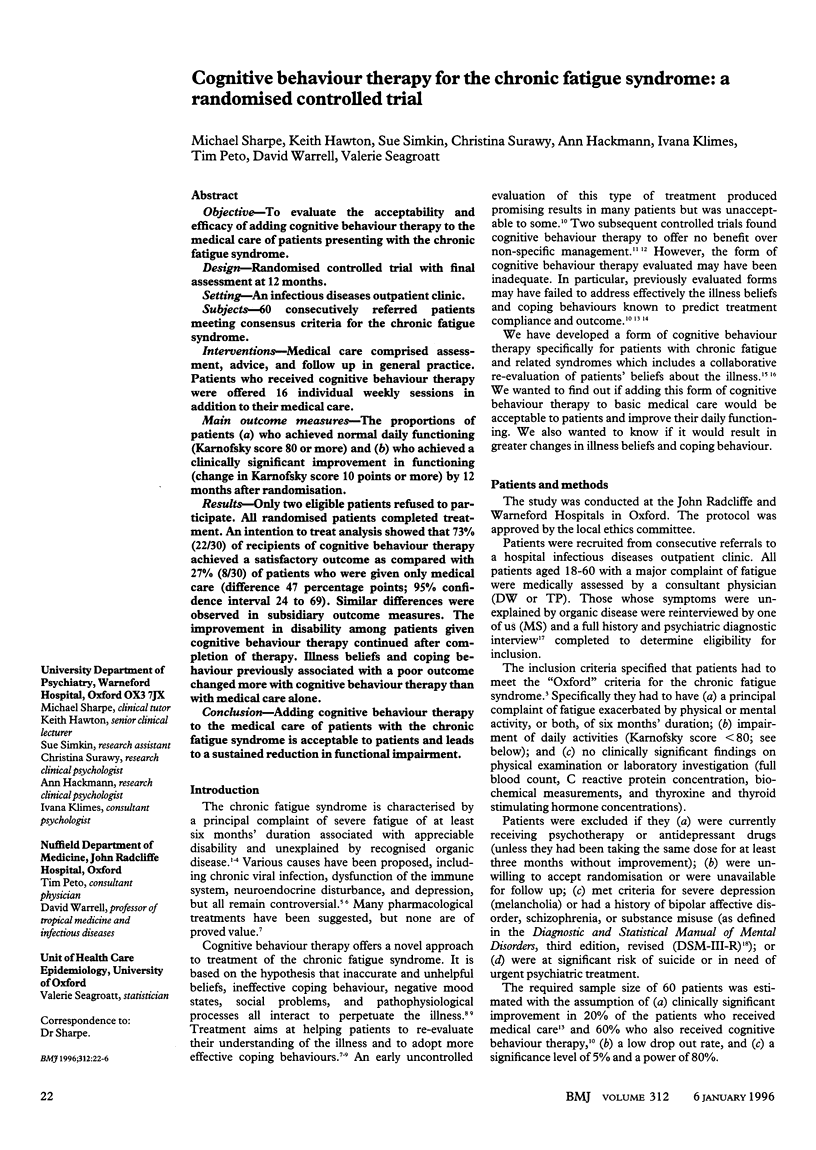
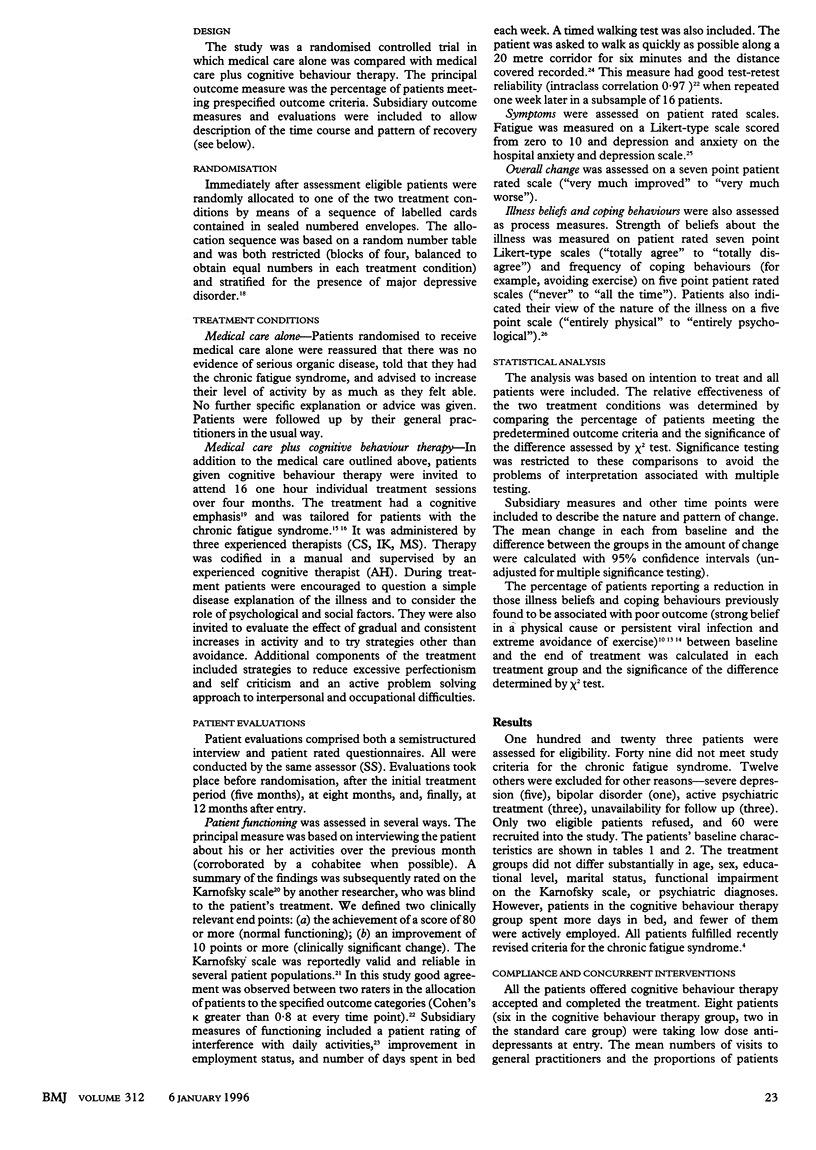
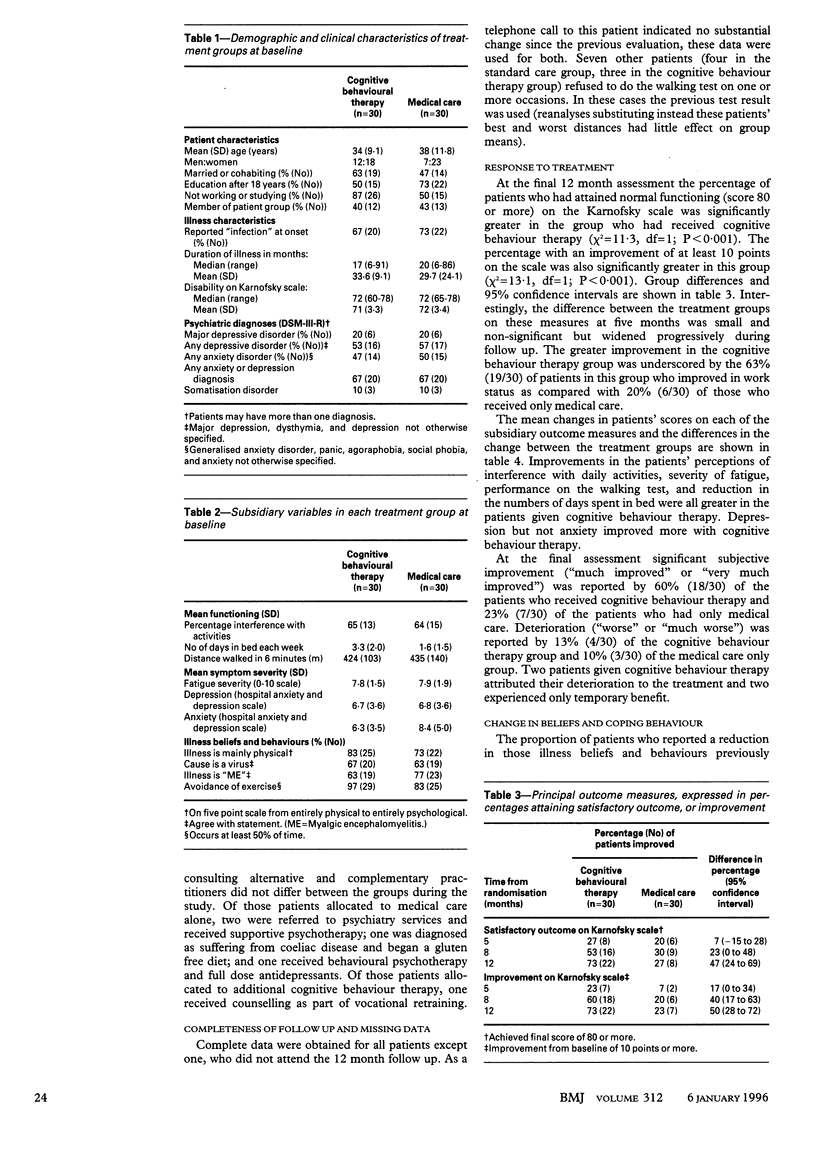
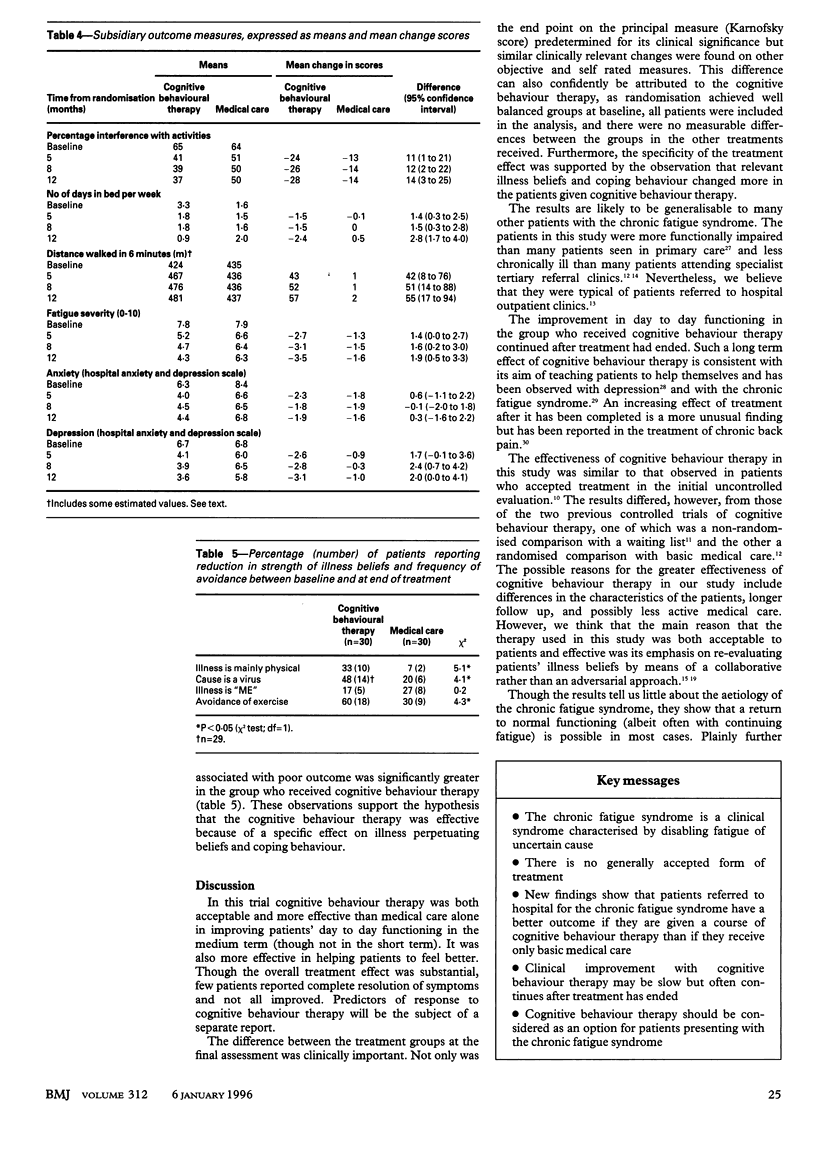
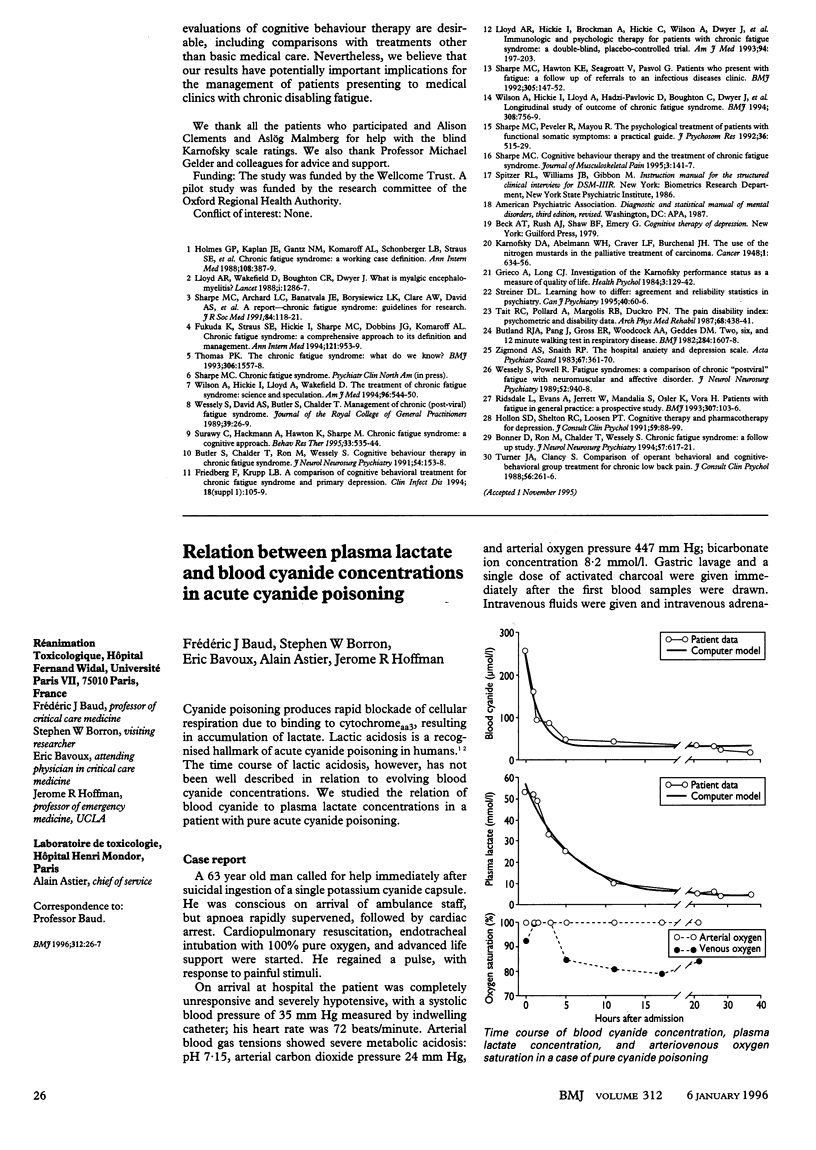
Selected References
These references are in PubMed. This may not be the complete list of references from this article.
- Bonner D., Ron M., Chalder T., Butler S., Wessely S. Chronic fatigue syndrome: a follow up study. J Neurol Neurosurg Psychiatry. 1994 May;57(5):617–621. doi: 10.1136/jnnp.57.5.617. [DOI] [PMC free article] [PubMed] [Google Scholar]
- Butland R. J., Pang J., Gross E. R., Woodcock A. A., Geddes D. M. Two-, six-, and 12-minute walking tests in respiratory disease. Br Med J (Clin Res Ed) 1982 May 29;284(6329):1607–1608. doi: 10.1136/bmj.284.6329.1607. [DOI] [PMC free article] [PubMed] [Google Scholar]
- Butler S., Chalder T., Ron M., Wessely S. Cognitive behaviour therapy in chronic fatigue syndrome. J Neurol Neurosurg Psychiatry. 1991 Feb;54(2):153–158. doi: 10.1136/jnnp.54.2.153. [DOI] [PMC free article] [PubMed] [Google Scholar]
- Fukuda K., Straus S. E., Hickie I., Sharpe M. C., Dobbins J. G., Komaroff A. The chronic fatigue syndrome: a comprehensive approach to its definition and study. International Chronic Fatigue Syndrome Study Group. Ann Intern Med. 1994 Dec 15;121(12):953–959. doi: 10.7326/0003-4819-121-12-199412150-00009. [DOI] [PubMed] [Google Scholar]
- Grieco A., Long C. J. Investigation of the Karnofsky Performance Status as a measure of quality of life. Health Psychol. 1984;3(2):129–142. doi: 10.1037//0278-6133.3.2.129. [DOI] [PubMed] [Google Scholar]
- Hollon S. D., Shelton R. C., Loosen P. T. Cognitive therapy and pharmacotherapy for depression. J Consult Clin Psychol. 1991 Feb;59(1):88–99. doi: 10.1037//0022-006x.59.1.88. [DOI] [PubMed] [Google Scholar]
- Holmes G. P., Kaplan J. E., Gantz N. M., Komaroff A. L., Schonberger L. B., Straus S. E., Jones J. F., Dubois R. E., Cunningham-Rundles C., Pahwa S. Chronic fatigue syndrome: a working case definition. Ann Intern Med. 1988 Mar;108(3):387–389. doi: 10.7326/0003-4819-108-3-387. [DOI] [PubMed] [Google Scholar]
- Lloyd A. R., Hickie I., Brockman A., Hickie C., Wilson A., Dwyer J., Wakefield D. Immunologic and psychologic therapy for patients with chronic fatigue syndrome: a double-blind, placebo-controlled trial. Am J Med. 1993 Feb;94(2):197–203. doi: 10.1016/0002-9343(93)90183-p. [DOI] [PubMed] [Google Scholar]
- Lloyd A. R., Wakefield D., Boughton C., Dwyer J. What is myalgic encephalomyelitis? Lancet. 1988 Jun 4;1(8597):1286–1287. doi: 10.1016/s0140-6736(88)92107-1. [DOI] [PubMed] [Google Scholar]
- Ridsdale L., Evans A., Jerrett W., Mandalia S., Osler K., Vora H. Patients with fatigue in general practice: a prospective study. BMJ. 1993 Jul 10;307(6896):103–106. doi: 10.1136/bmj.307.6896.103. [DOI] [PMC free article] [PubMed] [Google Scholar]
- Sharpe M. C., Archard L. C., Banatvala J. E., Borysiewicz L. K., Clare A. W., David A., Edwards R. H., Hawton K. E., Lambert H. P., Lane R. J. A report--chronic fatigue syndrome: guidelines for research. J R Soc Med. 1991 Feb;84(2):118–121. doi: 10.1177/014107689108400224. [DOI] [PMC free article] [PubMed] [Google Scholar]
- Sharpe M., Hawton K., Seagroatt V., Pasvol G. Follow up of patients presenting with fatigue to an infectious diseases clinic. BMJ. 1992 Jul 18;305(6846):147–152. doi: 10.1136/bmj.305.6846.147. [DOI] [PMC free article] [PubMed] [Google Scholar]
- Sharpe M., Peveler R., Mayou R. The psychological treatment of patients with functional somatic symptoms: a practical guide. J Psychosom Res. 1992 Sep;36(6):515–529. doi: 10.1016/0022-3999(92)90037-3. [DOI] [PubMed] [Google Scholar]
- Surawy C., Hackmann A., Hawton K., Sharpe M. Chronic fatigue syndrome: a cognitive approach. Behav Res Ther. 1995 Jun;33(5):535–544. doi: 10.1016/0005-7967(94)00077-w. [DOI] [PubMed] [Google Scholar]
- Tait R. C., Pollard C. A., Margolis R. B., Duckro P. N., Krause S. J. The Pain Disability Index: psychometric and validity data. Arch Phys Med Rehabil. 1987 Jul;68(7):438–441. [PubMed] [Google Scholar]
- Thomas P. K. The chronic fatigue syndrome: what do we know? BMJ. 1993 Jun 12;306(6892):1557–1558. doi: 10.1136/bmj.306.6892.1557. [DOI] [PMC free article] [PubMed] [Google Scholar]
- Turner J. A., Clancy S. Comparison of operant behavioral and cognitive-behavioral group treatment for chronic low back pain. J Consult Clin Psychol. 1988 Apr;56(2):261–266. doi: 10.1037//0022-006x.56.2.261. [DOI] [PubMed] [Google Scholar]
- Wessely S., David A., Butler S., Chalder T. Management of chronic (post-viral) fatigue syndrome. J R Coll Gen Pract. 1989 Jan;39(318):26–29. [PMC free article] [PubMed] [Google Scholar]
- Wessely S., Powell R. Fatigue syndromes: a comparison of chronic "postviral" fatigue with neuromuscular and affective disorders. J Neurol Neurosurg Psychiatry. 1989 Aug;52(8):940–948. doi: 10.1136/jnnp.52.8.940. [DOI] [PMC free article] [PubMed] [Google Scholar]
- Wilson A., Hickie I., Lloyd A., Hadzi-Pavlovic D., Boughton C., Dwyer J., Wakefield D. Longitudinal study of outcome of chronic fatigue syndrome. BMJ. 1994 Mar 19;308(6931):756–759. doi: 10.1136/bmj.308.6931.756. [DOI] [PMC free article] [PubMed] [Google Scholar]
- Zigmond A. S., Snaith R. P. The hospital anxiety and depression scale. Acta Psychiatr Scand. 1983 Jun;67(6):361–370. doi: 10.1111/j.1600-0447.1983.tb09716.x. [DOI] [PubMed] [Google Scholar]



